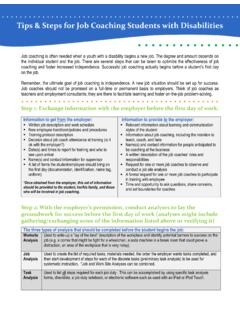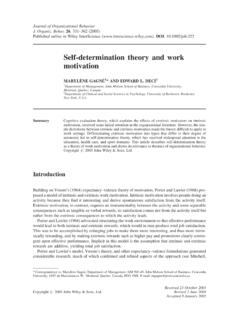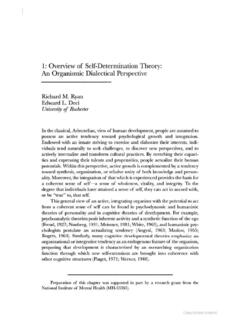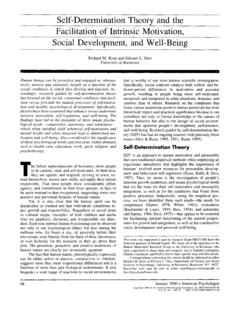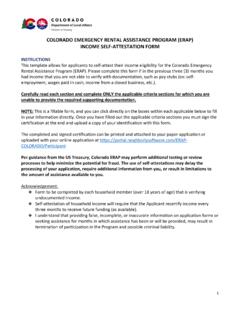Transcription of Lesson Plans for Teaching Self-Determination
1 Lesson Plans for Teaching Self-Determination Table of Contents Knowing Yourself 3. Communication Styles 21. Assertiveness Skills 30. Applying Assertiveness Skills 36. Listening Skills 44. Handling Feedback 47. Negotiating 51. Rules, Rights, & Responsibilities 56. Tackling Infringements on Rights 59. Life After School 62. Understanding the Law 70. What is Special Education 85. Voting 94. Lesson 1. Knowing Yourself 2. Lesson Plan #1 Knowing Yourself Objective: Students will be able to express and identify their goals, objectives, dreams, desires, strengths, and weaknesses. They will have the opportunity to discuss their disability and have the ability to identify and express the strengths and weaknesses associated with their disability. Principle(s) of Self-Determination support: Freedom and Authority Alaska Content Standard(s) supported: Skills for a Healthy Life: A- A student should be able to acquire a core knowledge related to well-being.
2 3) understand and identify the causes, preventions, and treatments for diseases, disorders, injuries, and addictions;. B- A student should be able to demonstrate responsibility for the student's well being. 4) develop an awareness of how personal life roles are affected by and contribute to the well-being of families, communities, and cultures;. 5) understand how personal relationships, including family, friends, and co-workers impact personal well-being;. C- A student should understand how well-being is affected by relationships with others. 3) evaluate how similarities and differences among individuals contributes to relationships;. 4) understand how respect for the rights of self and other contributes to relationships;. 5) understand how attitude and behavior affect the well-being of self and others;. Alternate Performance Standards: Manage personal needs '. Act safely and responsibly '. Maintain positive interpersonal relationships '.
3 Contribute meaningfully in the community '. Activities: Life Review: Help students walk through this structured question sheet/interview to help the begin thinking about their dreams, Plans , strengths, and weaknesses. My Preferences: Guide students through this one page learning oriented question sheet. This activity helps students specifically focus on their learning styles and preferences. *What Do You Know About your Disability and Health Needs: Guide students through the process of discussing their disability, health needs, 3. and the implications of both. Be sure to be especially sensitive to boundaries and parents' wishes in this activity. *Should I Tell? : This activity is meant to help students decide when it may or may not be appropriate to disclose their disability. Talking to People who Know and Care: Have teachers, family members, friends, answer the interview questions on the Talking to People form.
4 Share the data collected through this process with the student while working through the Life Review, My Preferences, or Circle of Support Activity Circle of Support: Help student identify their respective Circles of Support to understand who can help them and support them. *Independence Activity #1: Discuss the fact that independence can be described in many ways. Some of these ways include: Freedom Making your own decisions Having control, power Choosing your own friends Deciding what to wear Doing what you want to do Doing things without our parents Taking care of yourself Paying your own way Independence is also something that can be present to different degrees in different areas: mental, physical, or emotional. For example, you might feel that you are completely in control of your thoughts, but not of your body. Limitations to your independence can come from two main sources: other people, and your own physical limitations.
5 *Independence Activity #2: Have students take a few minutes to think about the specific needs in their life that they feel hamper their independence. For example, some students may have to ask for help in brushing their hair or emptying their catheter. Some may need help in reaching dishes on a shelf or getting in or out of the car. Some may need help carrying a tray in the cafeteria. Some may need extra time changing classrooms at school. Have students ask themselves: What does independence mean to me? How independent am I in my different activities at home, at school, in my extracurricular life? What things get in the way of my being as independent as I. would like to be? How can I deal with the obstacles in my way? Is there any way to get over, around, or under them? Do I need help to do so? 4. Independence Activity #3: Present the following problem and idea to students. Problem: If you need a lot of help because of your disability, how can you still be independent?
6 Idea: Think of yourself as one of those big executives who runs a conglomerate. The executive makes decisions and others execute them for him. He is independent; he is making the decisions and deciding they will be carried out. He is thoughtful and considerate of those who work for him. You are the executive of your life! It doesn't matter if you actually do the driving or comb your hair. You make the decisions regarding when and how those things are done in your life! Learning when to be dependent and when to be independent and that each is OK and is part of learning to be interdependent. Materials: Life Review My Preferences Instructional Modifications What Do You Know About Your Disability? Are You Ready to Manage Your Own Healthcare? Should I Tell? Talking To People Who Know and Care Circles of Support 5. LIFE REVIEW. Compiled by Becky West and Helen Gritsch (used with authors' permission). WORK. 1. What are your Plans for after high school?
7 2. What jobs interest you? 3. Do you have the skills necessary to perform these jobs? 4. If not, how do you plan on acquiring those skills? 5. What skills do you have? 6. What job salary would you like to earn? 7. Do the jobs that interest you pay the salary you would like? 8. What job experiences have you had in the past? 9. Do you want your job to bring you power and recognition? 10. Would you prefer that your job is the same every day, or one that provides some daily variety? 11. Is it important that your job keeps you learning new things? 12. Would you prefer to know exactly what is expected of you on the job? 13. Do you like working with others or alone? 6. 14. Do you like working with your hands or your mind? 15. Is it important that your job is socially useful? 16. Do you need a job where you can use your creativity? 17. What kind of environment would you prefer working in ( , plush offices, outside, warehouse etc.)
8 ? 18. How much responsibility do you want at work?\. 19. How would you deal with a boss who you think has treated you unfairly? 20. How would you deal with a boss who yells at you a lot? 21. How do you deal with a boss who doesn't give you directions on what to do? 22. Do you work best on your own schedule or one directed by your employer? 23. Do you like to give directions or to be given directions? 24. Where do you see yourself 10 years from now? 25. Where do you see yourself 25 years from now? MONEY. 1. What value do you place on money? 2. Do you think a portion of your salary should be used to help others? 7. 3. If you had enough money, would you retire now? 4. If you see something you want, do you want to be able to buy it immediately or are you willing to save for it? 5. What percentage of your monthly income needs to be put into your savings account? 6. If your car is safe and runs well does it matter to you what it looks like?
9 7. Does you salary indicate how successful you are? 8. Is it important to save for retirement? MARRIAGE. 1. When you are an adult, who do you see included in your family? 2. What does commitment mean to you? 3. What is a good age to get married? 4. If you plan to marry, what qualities are you looking for in a mate? 5. If you plan on children, how many and at what age will you have them? 6. Will you and your spouse both work after marriage? Do you think you will both? 7. Would you or your spouse stay at home and be a full time parent if it meant never owning a house? 8. Who will care for your children if both you and your spouse work? 8. 9. Should your children be given money? If so, at what age and how much? 10. Do you think both husbands and wives should share in parenting and housework? 11. How will you split responsibilities? 12. How do you think money should be handled in the family? 13. Do husbands and wives share equal rights in the family?
10 14. How do you plan on disciplining your children? PHILOSOPHY. 1. What do you believe in? 2. What things in life are important to you? 3. What are your religious beliefs? 4. What are your political beliefs? 5. How do you define success in terms of: your family? work? society? personal happiness? 9. 6. How would you respond to: I would like to be remembered MISCELLANEOUS. 1. What hobbies do you enjoy? 2. What sports do you enjoy? 3. How do you spend your free time? 4. In what areas of your entire life do you feel most competent? 5. In what areas would you like to improve your competence? 6. What things are you committed to (family, graduating, etc.)? 7. What kind of support system do you have? 8. How do you deal with stress? 9. How do you manage your time? 10. How do you set priorities? 11. Where do you want to live: city, town, rural? geographic area? climatic area? apartment, house? 10. 12. How do you make decisions?
